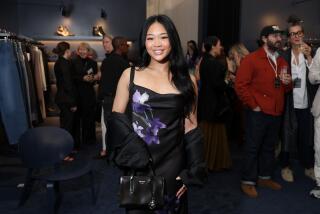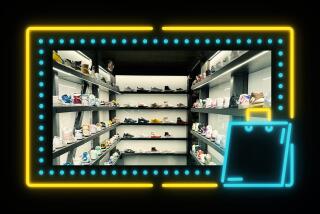Buy low, live high
Extreme-value retailing is the fastest-growing retail trend in the country. And Dave Gold is the king of extreme value, also known as deep-discount retailing. Gold is the founder of the 99 Cents Only Stores chain and the probable inventor of what’s fast becoming known as the 99-cent lifestyle.
An unassuming guy with rumpled hair and clothes to match, he drives a Toyota hybrid car because it gets 52 miles to the gallon, and he lives in the same Mid-Wilshire house with the same wife he started out with in the 1950s.
He is also on the Forbes 400 list for 2002, with 142 stores in his ever-expanding chain, no corporate debt, and an estimated personal fortune of $650 million. He is, according to some calculations, the 37th richest man in Los Angeles.
You’d never know it. Dave, as everyone calls him, is extremely accessible. You want to come see him? Sell him some of your firm’s discontinued or overproduced perfume, pantyhose, pork and beans? You want to show him some kitchen towels or plastic bowls you could produce in Asia, especially for his stores? Just drop in any Tuesday or Friday with samples. No appointment needed.
It was 20 years ago, after more than a decade of thinking about it, that Gold opened his first, small, 99 Cents Only Store in Inglewood, near the airport. He got the idea while working at the liquor store he inherited from his father in L.A.’s Grand Central Market.
“Whenever I’d put wine or cheese on sale for $1.02 or 98 cents, it never sold out,” Gold recalls. “When I put a 99ould sign on anything, it was gone in no time. I realized it was a magic number. I thought, wouldn’t it be fun to have a store where everything was good quality and everything was 99 cents?”
Friends and relatives told him he was nuts. His wife, Sherry, told him to put up or shut up. So he took the leap in 1982. Today, his stores average 20,000 square feet. He has expanded into Nevada, Arizona, and soon Texas.
Although he started out in areas where people were financially challenged -- and still caters to those customers -- he soon realized that “rich people love bargains if they’re of good quality.”
Lately, with the new frugality of the rich turning into a trend, Gold’s success has skyrocketed in what he calls high-end areas: Huntington Beach, Scottsdale, Ariz., and a branch he euphemistically calls “our Beverly Hills store,” which is actually at Wilshire Boulevard and Fairfax Avenue.
His headquarters in the City of Commerce are as understated as he is -- a warren of ancient offices with creaky floors attached to a giant warehouse that runs 24/7, 364 days a year -- he’s closed on Christmas. The warehouse, stocked with $50 million worth of merchandise on any given day, is a beehive of workmen in electric carts rolling through acres of cartons marked with such brands as Gerber, Sanyo, GE, Kraft and Del Monte.
Gold is 70, has two sons, a daughter and a son-in-law in the business, and seems almost embarrassed to discuss his extraordinary success. In interviews he consistently changes the subject to the success he’s provided for those around him.
“Our employees get 401(k)s, medical and dental. Since the company went public six years ago, all get stock options after six months of employment, and then every year thereafter. We’ve grown 25% a year, the stock has split five times, and a lot of people have made significant money,” he says.
On a recent morning he introduced a young man who a few years back left high school to work in the warehouse. “He’s since worked his way up to merchandise manager and has purchased two homes -- the first in North Hollywood and the newest in Santa Clarita -- both fully paid for.”
Said one of Gold’s 12 merchandise buyers, who doesn’t want her name used: “I used to worry about the image. To say I buy for 99 Cents Only Stores didn’t sound that great. Now I see the store name doesn’t matter. I earn so much more here than I did at [the upscale department store] where I used to be a buyer -- and I get so much more pleasure. It’s like a family. And it’s fun.”
Well, yes, and it’s as wacky as a Marx Brothers movie, especially on Tuesdays and Fridays, the open-house days for people who want to sell products to Gold and his staff of merchandise mavens. It’s almost impossible to describe the crowd that lines the narrow hallway on these days as they sip coffee and munch bagels -- a nicety provided by Gold for the vendors who may wait hours before a buyer looks at their samples.
Many of the visitors are “regulars” -- a few stooped, ancient men in yarmulkes who sell vacuum bags and the like, and say they’ve known Gold since he was a boy working in his father’s store. And a large contingent of sleek, elegant young Asian men and women, often members of the ruling class back home, where their parents (uncles, cousins, brothers) own design and manufacturing facilities.
They come to Gold’s City of Commerce headquarters hoping to sell everything from clothing to kites to hand-painted pottery, paper and housewares products -- anything that has been overproduced and is taking up space in the family warehouses. Better to convert it to cash, even if they take a huge loss, than to let it sit and rot.
In some cases, they are there to make deals to produce special merchandise for Gold’s chain -- a low- or no-profit venture for the manufacturers, but one that at least keeps their machines and employees working until orders from regular stores come in.
Then there are the natty, corporate regulars, who visit Gold every quarter with overruns of name-brand food products and other merchandise that usually sells in higher-priced stores. A little more than 50% of the chain’s stock is in brand-name merchandise that is either an overrun or a close-out because packaging has changed.
Gold says he sells only merchandise that is fit for sale in regular stores, buys only one in every 15 items he’s offered. And he never stops searching.
While visiting the Museum of Modern Art in New York some time ago, Gold’s son-in-law asked the gift shop manager what the museum does with its unsold Christmas cards each year. “We don’t know what to do with them,” the manager answered. “We have them sitting in a warehouse.”
A deal was struck, and that’s why some of the handsomest boxed cards in Los Angeles this year, marked $10.95 on the back, were selling for 99 cents a box in the 99 Cents Only Stores.
What’s next for Gold? Low-cost furniture? “I’m 70, how much more do you expect?” he asks with a laugh. “I intend to keep my focus on anything that’s a decent buy.”
More to Read
Inside the business of entertainment
The Wide Shot brings you news, analysis and insights on everything from streaming wars to production — and what it all means for the future.
You may occasionally receive promotional content from the Los Angeles Times.








